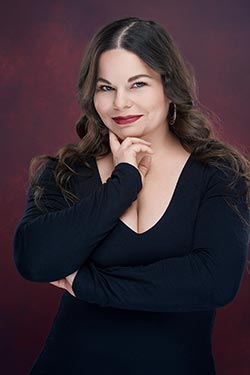Ing. Ladislava Černá, Ph.D.
Head of the Laboratory for Photovoltaic System Diagnostics, Faculty of Electrical Engineering, CTU in Prague

She studied Electrical Engineering and Informatics at the Faculty of Electrical Engineering, CTU. For almost 15 years, she has been the head of the Accredited Laboratory for Photovoltaic Systems and also works as a consultant for the State Environmental Fund. In addition to diagnostics, she focuses primarily on photovoltaic applications and education in the field of photovoltaics and energy storage.
What is your area of expertise at CTU, and what do you enjoy most about your work?
In my professional world, I focus on photovoltaics, its application in various systems, and, of course, teaching. Photovoltaics is very unique in that it is extremely interdisciplinary—one moment, you're dealing with technology, then physics, then economics, law, energy, and sometimes even a bit of politics. What I enjoy most about this field is precisely the ability to switch between different activities. Moreover, it is a field that is now quite close to everyday people (many have photovoltaic systems at home, almost everyone has a solar calculator or a small solar-powered car), so teaching and workshops attract a wide range of participants—from children to students to industry specialists. In this field, you never get bored, and there is always something new to learn.
What led you to science?
In my case, science is not in the form of basic research but rather in the area of applications, so it was mainly external stimuli that drew me to it. It has always been important to me to do things that have real meaning. When people from the industry came to us with real problems, they needed solutions—and finding solutions can sometimes be a great scientific challenge.
How do you balance your personal and professional life?
I believe that the academic environment is actually ideal for balancing personal and professional life. I have two children, one of whom is quite young (4 years old), and I really appreciate that it is never a problem to bring a child to the workplace—no one minds, and on the other hand, working from home when necessary is perfectly acceptable, as the important thing is getting the work done, not necessarily from where. Additionally, there are always plenty of kind colleagues at the faculty who will pick up your child from kindergarten, look after them, or sometimes just give them a piece of chocolate when they pass by. The same applies when someone needs flexibility for other reasons—parents, friends, partners...
Would you recommend a scientific career to high school girls? If so, why?
I would say yes, but it's fair to mention a few things. People usually talk mainly about the positives of a scientific (or generally academic) career. However, there are also a few aspects that young women should know before deciding on this path.
You can’t just put scientific work in a drawer—it stays with you in your mind all the time. Once you become known in the field, people won’t leave you alone. Scientific work is highly irregular, meaning that although there is more freedom in managing your time (we don’t have time clocks), it also means that sometimes you have to work long hours in a row, even if labor laws technically forbid it.
So, if I had one recommendation, it would be this: "If you're the kind of person who needs to complete one task before moving on to the next, this career might not be for you. But if you love new challenges, enjoy learning, dislike repetitive tasks (though they are sometimes necessary, so be prepared), and value freedom, then go for it!"